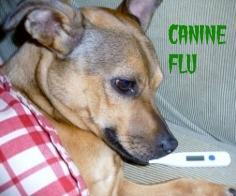Canine Influenza
- posted: Apr. 17, 2015

What You Need to Know About Canine Influenza
We have been receiving a lot of questions about a recent news story detailing an outbreak of canine influenza in Chicago. Here is what you need to know about the canine flu virus.
What is canine influenza?
Canine flu is a virus similar to the human flu virus, but affecting only dogs. It causes coughing, sneezing, fever and lethargy in dogs. Symptoms can be mild to severe. Most dogs will recover in about two weeks. Some dogs may need supportive care in the form of IV fluids and medications to reduce fever. Because it is a virus, there is no direct treatment, but some dogs may develop pneumonia and secondary bacterial infections, so antibiotics may be used in some cases. A few dogs have died from the virus.
The canine flu virus was first discovered in 2004 at several greyhound racing tracks in Florida. This flu strain is known as H3N8 and has since spread to 30 states including Pennsylvania. Tests on the dogs affected by the recent outbreak in Chicago have revealed that they have been infected by a new strain of canine flu, H3N2. This strain was previously limited to Korea, China and Thailand but was recently introduced into the United States in the Chicago area.
How is Canine Flu Spread?
Canine flu is spread by airborne droplets released when dogs cough or sneeze, by contaminated surfaces like cages, food and water bowls, collars and leashes, and by people’s hands or clothing that have come in contact with infected dogs. The virus can readily spread among dogs in situations where large numbers of dogs are in close contact with one another such as doggie daycare facilities, dog parks, boarding kennels, and shelters. The virus may survive 12-48hrs on surfaces, clothing and hands. Dogs usually become ill 2-4 days after being exposed and can shed virus and infect other dogs for 7-10 days.
How Can I Protect My Dog?
A vaccine is available for the H3N8 strain of flu; however, it is unknown at this time if the current vaccine cross-reacts and provides protection against the new H3N2 strain. Not all dogs need this vaccine, but if your dog is frequently in high risk situations such as dog parks, kennels, and doggie daycare, you may want to consider having him vaccinated. Limiting exposure to areas where large groups of dogs may congregate may also reduce the chances of exposure. Limit contact with any dogs who are coughing and sneezing and wash your hands and change clothes if you work with or contact dogs who may be ill such as at a shelter or rescue.
We want to stress at this time that we have not seen any cases of the new flu strain in south central Pennsylvania and there appears to be no immediate threat. However, if your dog is experiencing any respiratory symptoms such as coughing and sneezing accompanied by lethargy, please make an appointment to have him or her examined. We will keep you updated if canine flu becomes a concern for dogs in the York area. More information can be found at www.AVMA.org and www.pavma.org.
This blog brought to you by the Patton Veterinary Hospital serving Red Lion, York and the surrounding areas.
Location
Patton Veterinary Hospital
425 E Broadway
Red Lion, PA 17356
